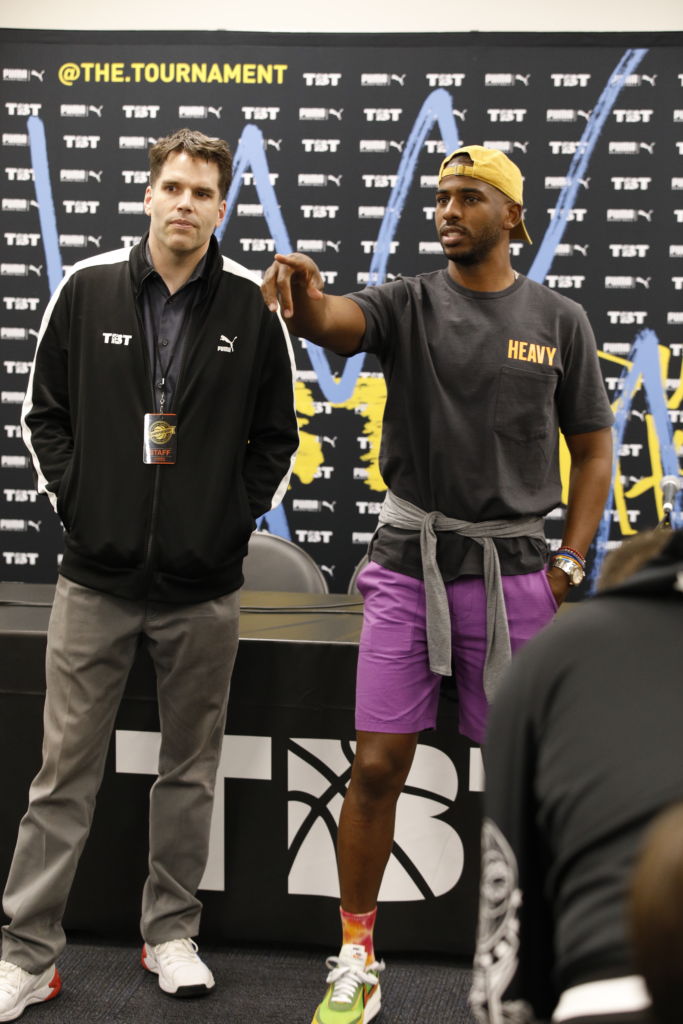TBT showcases former NCAA players, and this year an NBA star in Joe Johnson, but its format appeals across international borders.
The first professional basketball event to return in the U.S. amidst the COVID-19 pandemic was not the NBA playoffs but rather the upstart TBT. The Basketball Tournament is a winner-take-all bracket created in 2014 by comedy writer Jon Mugar. It’s a showcase for overseas professionals to play back home but it also disrupts some traditional elements of the sport in this country.
Mugar’s tournament also draws interest from around the world. In June, the New Zealand National Basketball League announced that it would adopt the Elam Ending, TBT’s unique method of closing games. A few weeks later, the league announced the decision was on hold due to international gambling issues, but would remain an option, according to NBL league manager, Justin Nelson.
“While there is a real desire at our end to deliver this initiative as a way of deciding a drawn game, we obviously need to make sure that all our partners, in and out of regulated wagering, are able to proceed with it,” Nelson said in a league press release. “We strongly value our partnerships and we will keep working hard to see if the ‘First to 7’ (Elam Ending) initiative can be introduced in the future.”
Nick Elam, now a professor at Ball State University, created the eponymous game ending which TBT and more recently, the 2020 NBA All Star Game, adopted. Elam came up with the idea after studying nearly 400 NBA games as a more exciting end to a game. The ending removes the game clock in the last four minutes of the fourth quarter and sets a point total (the leading team’s score at the time plus eight points) that both teams aim to achieve first. This approach works to avoid the trailing-team strategy of sending the other team to the free throw line repeatedly and requires them to play lock down defense in addition to scoring.
“I think we’ll have a full club from a professional league overseas play certainly within the next five years,” Mugar said.
Mugar and co-founders Dan Friel and Jen Todd created TBT in 2014 as a platform for anyone who wanted to enter a team into a March Madness-style event. Initially, the winning team won $1 million. The purse grew to $2 million in 2016, but it returned to $1 million for this year’s pandemic-influenced edition.
Overseas Elite, a team originally composed of only international professionals, won four straight TBTs from 2015 to 2018 and didn’t lose a game until 2019. This year, the team added Joe Johnson, a 17-year NBA veteran and seven-time All Star, in a bid to get back on the winning track. In all, the team has won $7 million, which was split among its players, GM, and fans.
That’s right: Anyone who registers as a fan for a specific team on TBT’s website receives a share of the winnings if their team wins it all. Mugar explained that fans of major professional sports teams often end up paying more when their team wins a championship, whether for higher priced tickets or new championship gear. That’s why he flipped the narrative by paying fans in his tournament.
Promotion – relegation in the U.S.?
Mugar hopes TBT will continue to challenge the status quo of professional basketball in the U.S. and worldwide. That hope includes an international sporting concept that, while common to European football fans, may seem radical to fans of the four major American sports leagues: promotion and relegation. The idea of seeing the rule in American sports, specifically in this case for TBT, intrigues Mugar.
“I think that all of a sudden TBT would not only be for money but a spot in the NBA,” Mugar said. “And then you give people the chance to assemble their own roster to get in the NBA with six wins. It would kind of blow everyone’s minds.”

Players who earn spots on NBA rosters may not exactly agree with that idea, so it’s unlikely to be adopted in the U.S. in the near future. But it remains an intriguing proposition for Mugar.
“I think things like that are, they sound crazy, and they’ll never happen and are insurmountable from the union and business, legal perspective,” Mugar said. “But things like that are so fun and interesting for fans.”
That’s why TBT is such a fresh take on a century-plus old sport. Mugar and the TBT team are willing to tweak the rules as it ages. And that willingness to craft the most exciting possible version of basketball has drawn interest from international leagues in addition to the NBA and NCAA. Not only are leagues such as New Zealand looking to adopt some of the rules, but international teams have reached out to Mugar about entering the tournament.
“I think we’ll have a full club from a professional league overseas play certainly within the next five years,” Mugar said. “I’d be surprised if that didn’t happen. It always comes down to how much to the cost and to their contracts and how long they spend for the summer. A lot of logistics on their end.”
Gaining the support of global superstars such as Chris Paul and Floyd “Money” Mayweather, who each sponsor a team in the 2020 TBT, also helps raise its profile.
Alumni get the old team back together
For players who participate in TBT, most of whom play professionally overseas, the tournament provides an opportunity to team up with friends in front of old fans from their college days. Demetris Nichols, who played at Syracuse University, is participating in his second TBT with a group of SU alumni called Boeheim’s Army. Though he spent time early in his career in the NBA, Nichols has played most of his pro ball in countries like France, Russia, and most recently Italy, for Sidigas Avellino of Lega Basket Serie A. He’s enjoyed the opportunity to play back in the U.S. in TBT during the summer, which is usually the offseason for professionals.
“It gives me a chance to obviously stay in shape, but it also gives my fans – people who watched me play when I was younger – a chance to see me play because they can’t or haven’t seen me play in Europe for the past 12 years,” Nichols said. “I think it’s a great thing for everybody, for TBT, for players who don’t play in the NBA. But also, players who play overseas who want to play in front of their family and friends.”
Creating those moments for players and fans to reconnect keeps Mugar and his team motivated to keep TBT going strong.
“It’s one of the coolest, most unforeseen aspects of TBT is, what is the type of player that persists with their career and what these players are like after being overseas,” Mugar said. “You hear these people talking in press conferences after games and how worldly they are and just how grounded.”
Thinking global
Now the question turns to how TBT, still in its infancy, will affect the sport globally. Could it be a precursor to a club world cup? Something like the EuroLeague but with teams from all of the major domestic leagues around the world? Could it include the Los Angeles Lakers, CSKA Moscow, and Real Madrid, all paired up together in one bracket?
Lindsay Sarah Krasnoff, an international sports historian and journalist, thinks other continents would need to build stronger infrastructure for a club world cup to take shape.
“Once you get Basketball Africa League up and off its feet,” Krasnoff said. “If you can create a similar, inter-regional league in Asia, Southeast Asia; I think then you can have something like a club world cup.”
A global version of TBT may not arrive for another decade or so, if it ever does. For now, Mugar and his team focus on putting the best possible product in front of fans and creating an environment for overseas professionals to win money and reconnect.
“The money — everyone will tell you the money is great,” Mugar said. “They want to win it. But it’s really about connecting them to the fan bases that they used to play in front of, connecting them to teammates. It’s the whole experience of just going on this journey. And the camaraderie with it. That makes TBT what it is.”
*Crossover International’s Nicholas D’Alessandro contributed to the reporting for this story
Header image: Justin Burrell moves Overseas Elite’s nameplate into the champion spot after his team won TBT in 2017. Photo by Doug Kapustin/courtesy of Wikimedia Commons.

